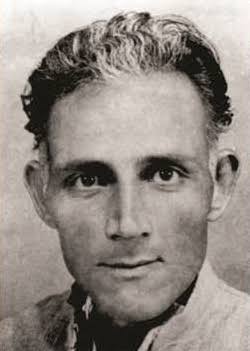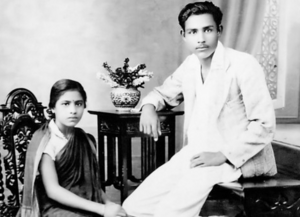Gajanan Madhav Muktibodh facts for kids
Quick facts for kids
Gajanan Madhav Muktibodh
|
|
|---|---|
 |
|
| Born | 13 November 1917 Sheopur, Central Provinces (present-day Chambal, Madhya Pradesh) |
| Died | 11 September 1964 (aged 46) Habibganj, India |
| Occupation | Writer, poet, essayist, literary critic, political critic |
Gajanan Madhav Muktibodh (गजानन माधव मुक्तिबोध) (November 13, 1917 – September 11, 1964) was a very important Hindi writer. He was known as a poet, essay writer, and critic in the 20th century.
Many people see Muktibodh as a leader in modern Hindi poetry in India. He was a key figure in the "Experimentalism" (Prayogvaad) movement in Hindi literature. He also helped shape the "New Story" (Nayi Kahani) and "New Poetry" (Nayi Kavita) styles of the 1950s. He was also important in starting "New Criticism" in Indian literature.
Muktibodh was born in Sheopur, Madhya Pradesh. He was one of seven poets in the first book of Tar Saptak (1943). This book was a series of poetry collections that changed Hindi literature. It moved away from the old romantic style and started new ideas like "Experimentalism" and "Progressivism." These new ideas later led to the "New Story" movement.
Contents
About Muktibodh's Writing Style
Muktibodh was greatly influenced by ideas like Marxism and Existentialism. These ideas made him express his unhappiness with society at the time. He was seen as a very important Marxist Hindi poet in India after it became independent. He also helped start modernism in Hindi poetry.
He continued to show his progressive ideas even after a group called the Progressive Writers' Movement ended in 1953. Throughout his career, he fought against other modern writing styles.
His Most Famous Poems
Muktibodh is best known for his long poems. These include Brahma-rakshasa (ब्रह्मराक्षस), Chand ka Muh Teda hai (The Moon Wears a Crooked Smile), and Andhere Mein (In the Dark). Another famous work is Bhuri Bhuri Khak Dhul (The Brown Dry Dust). All his works were published together in 1980 in six books called Muktibodh Rachnavali.
Brahmarakshas is thought to be one of his most important experimental poems. It uses special images to show a smart person who gets lost in their own thoughts. This person becomes so focused on being perfect that they lose touch with reality.
His Brother, Sharadchandra
Muktibodh had a younger brother named Sharadchandra Madhav Muktibodh (1921–1985). Sharadchandra was also a poet, novelist, and critic who wrote in Marathi. He won the Sahitya Akademi Award in 1979.
Muktibodh's Published Works
Muktibodh's first book, Chand Ka Muh Teda Hai (चाँद का मुहँ टेढ़ा है), was published in 1964. This was when he was very ill, close to his death. Even though he couldn't publish his own books during his life, he was a poet in the first three Tar Saptak collections. These were important poetry books edited by Ajneya.
His other poems were collected in "Bhoori Bhoori Khak Dhool." All his collected works were later published as 'Muktibodh Rachnavali'. Today, he is seen as a link between the "Progressive" poetry movement and the "Modern Poetry" (Nayi Kavita) movement in Hindi.
His Work as a Critic
Muktibodh also became well-known for his strong opinions as a critic. He wrote about how the upper classes influenced the end of the Bhakti movement in India. He saw this movement as a rebellion by lower classes against the power of the upper classes.
In literary criticism, he wrote an important work about Jaishankar Prasad's Kamayani. This work was called Kamayani, Ek Punarvichar.
His book Ek Sahityik ki Diary (A Writer's Diary) was first written for a newspaper column. Later, it appeared in a journal from 1957 to 1960. This book shows his ideas on literature and society. It also gives a look into how he thought. It was first published in 1964. One famous part of this book is the article Teesra Kshana (Third Moment). In it, he talks about how creative writing happens in three steps: inspiration, making it less personal, and then expressing it.
Muktibodh in Media
|
(चाँद का मुहँ टेढ़ा है) |
The wind's sari border quivers bullets pierce empty |
| – Muktibodh |
A Hindi movie called Satah Se Uthata Aadmi (Arising from the Surface) was based on his script and dialogues. The famous director Mani Kaul directed it. The film was shown at the Cannes Film Festival in 1981. In 2004, a play called "Brahmarakshas ka Shishya" was performed in New Delhi. It was based on one of Muktibodh's stories.
His novel, Vipatra, has also been made into an audio book for people who are blind.
Muktibodh's Lasting Impact
Muktibodh's amazing talent was truly recognized after his death. This happened when Chand Ka Munh Tedha Hai, his first collection of poems, was published in the early 1960s. Since then, the book has been printed many times and is considered a modern classic.
To honor his memory, the Madhya Pradesh Sahitya Parishad gives out an award every year called the MuktiBodh Puraskar. In 2004, a memorial called 'Muktibodh Smarak' was built for him. It is located at the 'Triveni Sangrahalaya' in Rajnandgaon, Chhattisgarh. It also honors other poets from Chhattisgarh.


